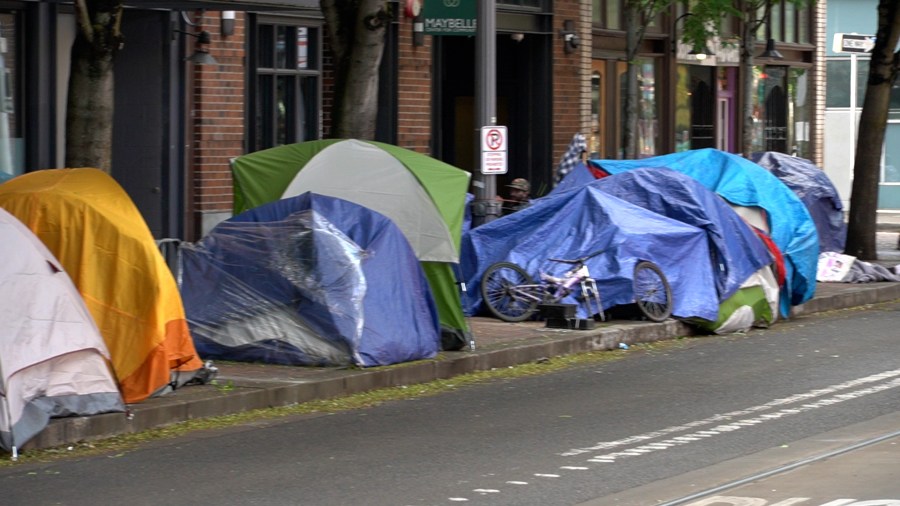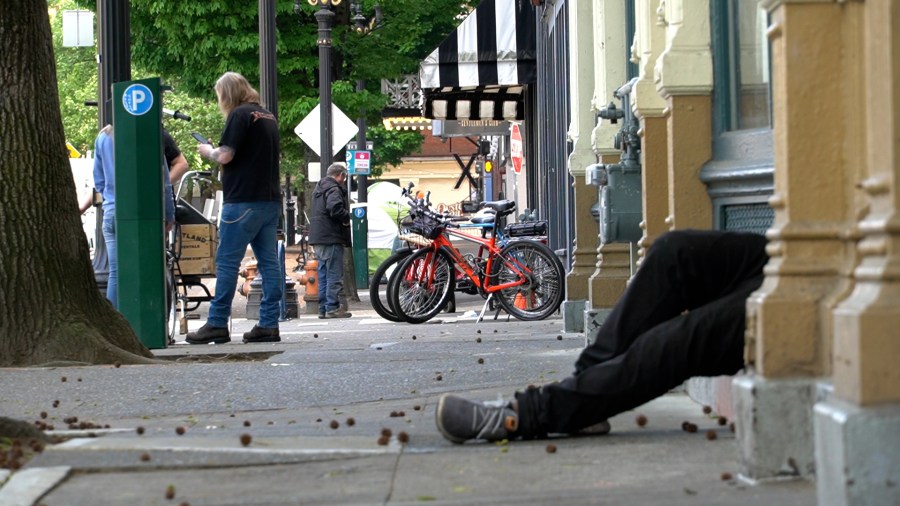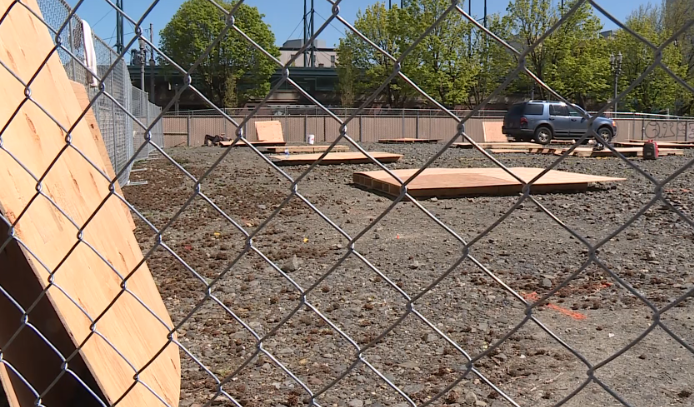PORTLAND, Ore. (KOIN) — Following the announcement the City of Portland would increase its removal of unsanctioned urban campsites in the city, with a focus on removing those that pose significant public health and safety risks among other criteria, Commissioner Jo Ann Hardesty is now saying she is keeping a watchful eye to make sure the city doesn’t engage in inappropriately aggressive sweeps outside the parameters of the new protocols.
When the measure was first announced last week, it came with a joint statement from Mayor Ted Wheeler and the other commissioners, including Hardesty, saying the new protocols “reprioritize public health and safety among houseless Portlanders and aim to improve sanitary conditions until we have additional shelter beds and housing available.”

After the city initially halted and then significantly scaled back its sweeps of homeless camps amid the COVID-19 pandemic, following guidance from the Centers for Disease Control and Multnomah County Health, the revised protocols restores some of the pre-pandemic practices, including prioritizing the removal of camps with eight or more structures and those that block sidewalks, transit stops, public restrooms and building entrances, including Americans with Disabilities Act accessibility requirements.
Officials said the number and sizes of camps increased during the pandemic, as well as the amount of trash and that the city’s COVID-19 protocols were deemed “ineffective” based on their analysis and feedback.
Camp removals under the new policy were slated to start on Monday, with seven sites having been posted for eviction on Friday, May 21, officials said. The new protocols do away with a 24-hour warning period that had previously been implemented amid COVID-19 to non-compliant camps prior to the 48-hour eviction notice postings.
In addition, camps with “verified reports of violence, arrest, or criminal activity” were also noted as being places where evictions would occur under the new guidance.
In an email to KOIN 6 News, Hardesty said she provided feedback on the new protocols “and while there were some changes made due to my comments the end result is still not how I would have written them.”
However she also said the Homelessness and Urban Camping Impact Reduction Program is not in her portfolio, but she appreciated being able to weigh in on the changes, and generally thinks the new protocols “are a step in the right direction to ensuring HUCIRP is focused on the health and safety of the houseless and not being an instrument to forcefully shuffle people from one corner of the city to the next.”
Hardesty said ensuring the HUCIRP policies are used appropriately “does not stop here.”
In her statement to KOIN 6 News, Hardesty referenced a report in Willamette Week that alleged a meeting over Zoom took place in mid-May with managing partners from many of Portland’s largest law firms to express their grievances regarding downtown homeless camps to Sam Adams, the mayor’s office’s director of strategic innovations, which includes coordinating trash clean up work in the city. The article stated many of the law firms lease spaces downtown and said if the camps were not removed soon, they may take their businesses elsewhere.

According to the report, Adams communicated a plan by the city that they would move homeless campers from downtown sidewalks to new, city-sanctioned campsites around Portland.
“Even as we try to focus and retool HUCIRP there are reports of some wanting to aggressively sweep houseless community members outside the scope of these standards as recently reported by Willamette Week,” Hardesty said. “It is my hope that these protocols, while imperfect, and our joint statement will be an effective tool at preventing such aggressive actions, however I am carefully watching to see how they are implemented.”
Hardesty added that she looks forward to working with her colleagues on how to best utilize HUCIRP and will not hesitate to push for more changes should she feel the protocols need additional work.
Adams responded via email to an inquiry by KOIN 6 News, tacitly acknowledging a meeting with law firms took place, but not confirming the finer details of the meeting other than to say: “Wheeler and [Commissioner] Ryan’s work on this safe camping spots concept predates meeting with law firms.”
Mayor Wheeler’s office responded via email to an inquiry from KOIN 6 News in which spokesperson Tim Becker confirmed that a meeting between Adams and law firms did take place.
“Sam did have this meeting with downtown law firms. The Mayor and Commissioner Ryan were working on safe camping/rest area management options, but would not be directly ordering individuals into these sites. The Offices submitted ARPA pre-proposal requests to fund such options to give in our engagement with people living throughout the City in public areas, not limited to downtown rights-of-way,” Becker said.
In terms of the plan for the city to identify sanctioned campsites, he said, “The City is currently working to identify City-owned properties for viable outdoor shelter, per a directive by Council while hearing the Shelter to Housing Continuum in April.”
Another city spokesperson, Heather Hafer from the Office of Management and Finance, told KOIN 6 News last week that property-owning bureaus were asked by city council earlier this month for an inventory of sites for development by June 18, with finalized lists required by June 30.
Becker added that the mayor’s office “stands by the joint statement from all members of the City Council,” which was released alongside the revised protocol announcement.
“The protocol language gives HUCIRP more tools to facilitate achieving their goal. The language doesn’t include the specific amount of operational scaling up that may occur,” he said.

Commissioner Dan Ryan, who oversees the city’s Housing Bureau and Joint Office of Homeless Services and Bureau of Development Services, also released a statement to KOIN 6 News via email in response to an inquiry we made on the issue of the new HUCIRP protocols, saying in part it is not an effort to sweep camps en-masse:
“In January of 2021, my office launched the Streets to Stability Task Force as an effort to work with every other Council office to create a unified voice and find unified solutions to our houselessness crisis. With 8 Streets to Stability Task Force meetings held to date and full participation from other Council offices, I am incredibly proud of the work we have done so far, and I know that slowing down our process related to updating HUCIRP protocols made it possible for us to achieve consensus and get this right. I want to be clear: what we are instituting is not a massive effort to sweep camps, and my office is working to minimize all law enforcement presence in the City’s interactions with houseless Portlanders. I welcome my colleagues’ commentary on this subject, and I know that we all share a vision to create safe, compassionate spaces for our unhoused neighbors. On that note, we have been working on a policy intended to address the unmet needs of our houseless neighbors, and I look forward to sharing more details soon.”
A spokesperson for Commissioner Carmen Rubio’s office told KOIN 6 News Rubio “does not find any aspects of the protocols disagreeable.”
“The media have, by and large, chosen to cover these new protocols as meaning that the City will begin clearing camps more quickly and forcefully. Commissioner Rubio signed off on these protocols because they reflect the parameters for intervening in campsites, not because they prescribe any particular pace or forcefulness. Any projection about pace and forcefulness is outside the parameters of those protocols,” said Will Howell, a spokesperson with Rubio’s office.
“As a group, we have been in conversation with unhoused Portlanders and housed activists working with them about how we can resolve those situations, and we are grateful for Commissioner Ryan for forging that relationship and leading those conversations. Any discussion of these protocols must be placed in context of both that work and Shelter to Housing, which will accelerate the pace at which we create new shelter options for people whose camps are deemed unhealthy or unsafe.”
A spokesperson from Commissioners Mingus Mapps’ office said he is supportive of the protocols proposed.
Below is the full statement Hardesty sent KOIN 6 News:
“I provided direct feedback on these protocols and while there were some changes made due to my comments the end result is still not how I would have written them.
HUCIRP is not in my portfolio and I appreciated the opportunity to weigh in on these changes and believe these new protocols are a step in the right direction to ensuring HUCIRP is focused on the health and safety of the houseless and not being an instrument to forcefully shuffle people from one corner of the city to the next. I also appreciated the statement my colleagues and I agreed to that made those intentions clear.
The work to ensure that HUCIRP is used appropriately does not stop here. Even as we try to focus and retool HUCIRP there are reports of some wanting to aggressively sweep houseless community members outside the scope of these standards as recently reported by Willamette Week. It is my hope that these protocols, while imperfect, and our joint statement will be an effective tool at preventing such aggressive actions, however I am carefully watching to see how they are implemented.
I look forward to working with my colleagues on how to best utilize HUCIRP and should I feel the protocols need additional work I will not hesitate to push for more changes.”